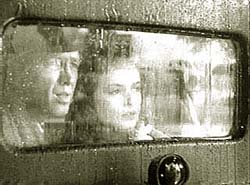Thanks to Karl Igelsias (See Our Craft, here), I took on a close reading of this script to look at characterization. The first forty pages demonstrate great characterization of complex and nearly impossible people. Melvin Udall first among them. So, thanks Karl. I think your Creative Screenwriting story is as good as self-instruction gets.
The movie left me disappointed, but I couldn't remember why. There's a nagging suspicion that the reluctant romance between Carol (Helen Hunt) and Melvin (Jack Nicholson) repelled me. So why bother with this exercise? Because the script is not the movie.
Reading it, I was damned impressed with comedy writing that avoids slam-bang of the kind of movies that make huge money fast. Incidentally, this James J. Brooks and Mark Andrus script is the seventh top grossing rom-com since 1978 (Box Office Mojo). Instead, I found clever, situational, and low-decibel stories about the timeless question: what is true love?
The opening scene is a perfect example of character exposition demonstrating the protagonist's flaws and strengths, and announcing Melvin Udall's need: this romance writer doesn't know what love is. His desire is to control his environment, and the more he stumbles into comically anarchic relationships with his neighbor and waitress, the more his world comes apart, letting real love in. (Sigh)
But the story stalled when Melvin engineers a trip to Baltimore with Carol and Simon, his neighbor. You'll remember that Simon was beaten by thieves in his own home. His treatment bankrupts him. He capitulates to his friend Frank's plan to ask his parents for money. Since Melvin made arrangements to get a good doctor on the case, Carol finally feels a bit of ease about her very sick son Spencer. Melvin volunteers to drive Simon to Baltimore so that he can give Carol a day off and try to impress her as a love interest.
During the drive to Baltimore, the script slows down. No, it pulls onto the shoulder and turns off the radio. Melvin and Carol temporarily move to the background, Simon moves to the fore with a long explanation of why his father threw him out, why he has no relationship with his mother, and why they cannot speak. It's exposition and it's late and it's all reported by Simon. Weirdly, Carol pulls over - stops the forward motion of the story - to hear Simon pull the painful threads of his life-story sweater.
It was a deliberate choice. I concede that the writers needed the information and the moment to contrast with Simon's decision not to beg for cash and instead turn for home. But Simon's confessional doesn't reveal enough about any of the main characters to have spun down the story momentum. While it puts pressure on Melvin to get Carol to pay attention to him, not Simon, Melvin doesn't reveal new traits or resources to do so. And the script doesn't regain its stride until the three return to New York.
As a side note, "things happen" to Simon, but it is Melvin's story. Simon's dog incites Melvin to dump it down the trash chute. Simon is beaten nearly to death, but Melvin calls 911. Simon is driven to financial ruin, but Melvin drives him to Baltimore. Simon loses his friends. Simon travels to Baltimore. Melvin responds, or is trapped into responding, to each of these. Dramatically, they are dependent. There's no story without Simon. There's no inner conflict without Melvin. It turns out that the movie left me cold because these two characters together make one man, but they don't form the kind of bond that shows us they recognize it.
I'm going to subject myself to the movie again, but in the meantime, fans of the script or movie should get out your flensing knives. Agree or disagree?
* John's Critique Rubric: For educational purposes only. It's hard to make a great movie: Respek, bro! Or as my friend the yogi says it, Namaste.
skip to main |
skip to sidebar

Yes, we have RSS feeds!


A hard look at stories to learn about writing movies

Yes, we have RSS feeds!
Principles
It all started with, "I could write a movie that bad." Turns out, even that's hard. So...
- Appreciate what's admirable.
- Identify what's slack; examine why.
- Think fast and publish quickly because writing stories, not blogging, is the real deal.
Affirmations (or "Get off your ass!")
Luck is opportunity plus preparation plus luck. - Jane Espenson ~~ Don't let better be the enemy of good. - John August ~~ The business must eat stories. Don't wait. - Eric Jacobson ~~ The screenplay is a container for money. - John David Roberts ~~ Things are OK when the things you complain about are the things you used to dream about. - Aaron Sorkin
About Me

- John David Roberts
- I'm an experienced learning and OD professional, who's onto the what's new in learning, and in my few hours of spare time I write screenplays.
Seen and Read, 2007 (Screenwriter)
- Jimmy the Gent (Bertram Milhauser)
- To Be or Not to Be (Edwin Justus Mayer)
- The Cabinet of Dr. Caligari (1962, Robert Bloch)
- Notorious (Ben Hecht)
- The Treasure of Sierra Madre (John Huston)
- Down in the Valley (David Jacobson)
- Daddy Long Legs (Henry Ephron, Phoebe Ephron, Jean Webster)
- The Bells of St Mary's (Leo McCarey, Dudley Nichols)
- The Bishop's Wife (Leonardo Bercovici, Charles Brackett, Robert E Sherwood, Billy Wilder)
- Atonement (Christopher Hampton)
- Breach (Adam Mazer, Wm. Rotko, Billy Ray)
- Charlie Wilson's War (Aaron Sorkin)
- Enchanted (Bill Kelly)
- Disturbia (Christopher B Landon, Carl Elsworth)
- Because I Said So (Karen Leigh Hopkins, Jessie Nelson)
- Freaks (Clarence Aaron Robbins)
- Hollywoodland (Peter Bernbaum)
- My Super Ex-Girlfriend (Don Payne)
- The Bourne Ultimatum (Tony Gilroy, Scott Z. Burns, George Nofli)
- Sicko (Michael Moore)
- Knocked Up (Judd Apatow)
- The Island (Caspian Tredwell-Owen, Roberto Orci and Alex Kurtzman)
- The Princess Bride (William Goldman)
- The Wizard of Oz (Noel Langley, Florence Ryerson, Edgar Allen Woolf)
- Ocean's Thirteen (Brian Koppelman, David Levien)
- Broken Flowers (Jim Jarmusch)
- Live Free or Die Hard (Mark Bomback)
- Local Hero (Bill Forsyth)
- Hot Fuzz (Edgar Wright, Simon Pegg)
- Shrek the Third (Andrew Adamson, Howard Gould, Jeffrey Price, Peter S. Seaman, J. David Stern, David N. Weiss, Jon Zack)
- One Crazy Summer (Savage Steve Holland)
- Severance (James Moran, Christopher Smith)
- The Science of Sleep (Michel Gondry)
- Spider Man 3 (Sam and Ivan Raimi, Alvin Sargent)
- The Lives of Others (Florian Henckel von Donnersmarck)
- Jesus Camp (Heidi Ewing, Rachel Grady, dirs.)
- The Holiday (Nancy Meyers)
- Stranger than Fiction (Zach Helm)
- On Broadway (Dave McLaughlin)
- The Pursuit of Happyness (Steve Conrad)
- The Namesake (Sooni Taraporevala)
- The Last King of Scotland (Jeremy Brock, Peter Morgan)
- The Devil Wears Prada (Aline Brosh McKenna)
- The Knack...and How to Get It (Charles Wood)
- Borat (Sacha Baron Cohen, Anthony Hines, Peter Baynham, Dan Mazer)
- The Departed ( William Monahan)
- Zodiac (James Vanderbilt)
- Children of Men (Alfonson Cuaron, Timothy Sexton, David Arata, Mark Fergus, Hawk Otsby)
- The Chronicles of Narnia (Ann Peacock, Andrew Adamson, Christopher Markus, Stephen McFeely)
- The Incredibles (Brad Bird)
- The Goonies (Chris Columbus)
- Letters from Iwo Jima (Iris Yamashita)
- Flags of Our Fathers (Wm. Broyles Jr., Paul Haggis)
- Night at the Museum (Ben Garant, Thomas Lennon)
- Notes on a Scandal (Patrick Marber)
- Man on Fire (Brian Helgeland)
- Pan's Labyrinth (Guillermo del Toro)
- The Painted Veil (Ron Nyswaner)
- Babel (Guillermo Arriaga)
- Blood Diamond (Charles Leavitt)
- The Queen (Peter Morgan)
Screenwriting Bloggers
Blog Archive
-
▼
2006
(39)
-
▼
February
(9)
- 'As Good As It Gets': The Second Act Stall *
- When Software Works, You Just Want to Kiss Someone
- Taking it Outdoors
- Happy Valentine's Day in Production
- Mysterious Skin
- Reducing Well-Intentioned Mistakes by One
- The Soundtrack, or Tell Me How I Should Feel When ...
- Should Screenwriters Act? I mean, try to, for edu...
- Transamerica
-
▼
February
(9)
Labels
- blog news (2)
- comedy (2)
- 2008 awards (1)
- Apatow (1)
- Bateman (1)
- Bill Forsyth (1)
- Bill Kelly (1)
- Christmas (1)
- Dan in Real Life (1)
- Die Hard (1)
- Disturbia (1)
- Enchanted (1)
- Gondry (1)
- Heigl (1)
- Hot Fuzz (1)
- Mira Nair (1)
- Paul Fieg (1)
- Peter Hedges (1)
- Rear Window (1)
- Rogen (1)
- Tambor (1)
- airport (1)
- character (1)
- dream (1)
- genre update (1)
- goal (1)
- heroes (1)
- horror (1)
- ignorance (1)
- irony (1)
- parallel story (1)
- sincerity (1)
- slasher (1)
- sleep (1)
- story (1)
- thriller (1)
- town vs corp. (1)

No comments:
Post a Comment